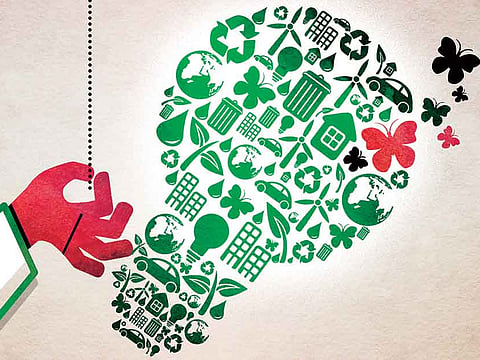The UN climate conference is just the beginning
By fostering global partnerships, as demonstrated by the UAE, we can address challenges of climate change

On November 30, the world will be a step closer towards addressing the critical challenge of climate change, as leaders gather in Paris for the 21st meeting of the Conference of Parties (COP21) of the United Nations Framework Convention on Climate Change (UNFCCC). The Paris climate negotiation will convene more than 190 countries with the goal of finalising a new global climate change agreement that will govern action on the issue after 2020.
The UAE has been an active player and a major supporter of this process.
Climate science warns that global warming will have a direct impact on us through rising sea levels and hotter summers, and also an indirect impact if some of the world’s major agricultural producers are disrupted by droughts or floods.
The forthcoming Paris Agreement, which has been under negotiation for several years, will be more inclusive than any preceding deal. Its main strength is a flexible structure that calls on all countries to present “Intended Nationally-Determined Contributions” (INDC) — actions to mitigate and adapt to climate change, developed in line with national priorities and circumstances. To date, more than 160 countries, including the UAE and all the major world economies, have presented INDCs.
These actions, taken together, are substantial. The International Energy Agency calculates that if fully implemented, they should keep temperatures from rising more than 2.7 degrees Celsius above pre-industrial levels. This is not enough, though, as many scientists use 2 degrees as a rough benchmark for avoiding the worst impact of climate change. Nonetheless, it is getting close.
The UAE’s INDC is ambitious and rooted in clear national policies. At its heart is the goal of having clean energy, including nuclear and renewable power, and provide 24 per cent of national energy needs by 2021. It also presents a wide range of actions on every front — from energy-efficiency standards to carbon capture and storage, from preserving mangroves that store and sequester carbon to investing in public transport. All this is presented as part of our broader focus on diversifying our economy.
When people ask about the potential success or failure of outcomes of the Paris meeting, it is important to recognise that most of the substantive action is embodied in these INDCs. To a significant extent, the UNFCCC process has already generated success by prompting countries to develop and present these plans.
So what is actually at play in Paris? I would point to a few key outcomes that the UAE will be looking for.
First, we need to ensure a robust and inclusive agreement. This agreement should be comprehensive and allow for a diversity of action, while recognising the different circumstances of countries. This is critical to ensuring that Paris sends a clear signal to business, finance, industry and the general public to take appropriate climate action.
Second, this agreement should lock-in for the long term the flexible approach that has yielded so much success this year. Countries should be encouraged to take ambitious action, but allowed to do so in ways that fit their national circumstances— such as the UAE’s focus on diversifying its economy towards a knowledge and technology-based economy.
Third, developed countries need to fulfil their pledge to provide funds and support the various mechanisms for technology transfer, adaptation and capacity-building that have been agreed over the years to support developing countries that have limited means to cope with the impact of climate change. This will help build confidence for the future.
Finally, we must recognise reaching an agreement in Paris is just a start. If we are truly to face the challenge of climate change then we have to turn political agreement into action.
This is where the UAE excels. With our focus on economic diversification, we have developed a strong track record of building new industries and opportunities. And with the clear guidance of our leadership, we have made clean energy a key part of our future economy.
This started with ambitious investments.
At home, we launched a programme to build safe, secure nuclear power plants. We started serious investments in renewable energy, including the Shams 1 solar power plant and more recently the Mohammad Bin Rashid Solar Park. Abroad, we are major investors in leading renewable energy facilities such as the London Array offshore wind farm and three concentrating solar plants in Spain.
This investment was supported by initiatives to ensure that lasting capacity was built in the UAE. Importantly, the Masdar Institute is leading ground-breaking research and technology development in areas fundamental to addressing climate change, such as energy and water. The institute is playing a fundamental role in cultivating technology and energy leaders that will help drive the UAE’s knowledge-driven industries.
Furthermore, the UAE has become the centre of global cooperation and debate. Abu Dhabi Sustainability Week (ADSW) — which includes the General Assembly of the International Renewable Energy Agency (Irena) hosted in the UAE, the World Future Energy Summit, the International Water Summit and the Zayed Future Energy Prize awards ceremony — is the world’s largest annual gathering on clean energy, water and sustainability. Together with hosting the World Energy Congress 2019 and the sustainability-focused World Expo 2020 in Dubai, the UAE is the place where the world comes together to build practical solutions.
It is clear that we cannot address climate change by simply limiting what we do. It is only through fostering global partnerships to harness innovation and practical solutions, as demonstrated by the UAE, that we can seriously address the challenges of climate change. The UAE is ready to continue playing a central role in this process, both by meeting its international climate commitments and by continuing to grow a low-carbon, sustainable economy at home.
Dr Sultan Ahmed Al Jaber is UAE Minister of State and Special Envoy for Energy and Climate Change.


